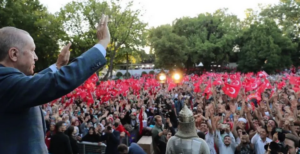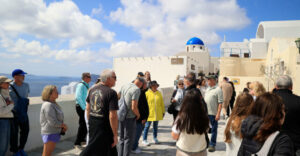When tanks blocked bridges in the heart of Istanbul and F-16s bombed Turkey’s parliament in Ankara on July 15, Western diplomats were caught by surprise. So too were U.S. forces stationed at the Incirlik Air Base in southern Turkey. The U.S. intelligence community had not an inkling that anything was amiss until the troops started moving. Once forces loyal to Turkish President Recep Tayyip Erdogan had put the attempted takeover down, he took to the airwaves and called the coup attempt “a gift from God” because it provided an excuse to crack down on competitors and opponents. Using enemies lists prepared well in advance, his purges have touched more than 100,000 and sparked widespread conspiracies among Turks that the July 15 coup was Turkey’s equivalent of the Reichstag fire, a manufactured crisis meant to allow a dictator to consolidate power. The transformation now under way in Turkey appears consistent with an agenda Erdogan has long worked to implement, secretly at first but with increasing boldness now.
Why have Americans so consistently misread Turkey and Erdogan, its leader since 2003? Long after Erdogan’s implementation of a program to transform Turkey into an authoritarian, Islamic state, senior American officials were describing Turkey as a model for the Muslim world and Erdogan as a democratic reformer.
There are two main reasons for such persistent error: credulity and obliviousness to history. First the credulity: Too many Americans amplify a narrow slice of elite, westward-looking Turkey into a representation of the whole. When Americans visit Turkey’s Mediterranean and Aegean coasts or visit tourist-friendly and trendy Istanbul neighborhoods, they see a Turkey foreign to most Turks and resented if not disdained by Erdogan and his allies. Erdogan was born in Kasimpasa, a poor Istanbul neighborhood, but spent his formative years in Rize, a small, impoverished Black Sea town in eastern Turkey. Many other leaders of his Justice and Development Party (or AKP) come from conservative Anatolian towns like Konya and Kayseri. Binali Yıldırım, an Erdogan loyalist and the current prime minister, is from Refahiye, a staunchly religious but backwater town 500 miles east of Istanbul.
The problem is not only what Americans see, but what they hear: Too many diplomats, politicians, and journalists have a bad habit of believing what interlocutors tell them, especially if they speak the language of Western liberalism. As Erdogan prepared for a visit to the White House just a month after his AKP triumphed in Turkey’s November 2002 elections, the New York Times described the former mayor of Istanbul—who had been impeached and imprisoned for religious incitement—as “a forward-thinking moderate.” Erdogan carefully cultivated the American Jewish community during his early visits. What Jewish leaders, however, saw as a genuine desire to promote interfaith dialogue was, for anyone reading Turkey’s Islamist newspapers, more a result of deeply ingrained anti-Semitic conspiracies: Since Jews control America, cultivating American Jews was the path to reach a shadow government right out of Protocols of the Elders of Zion, a book whose Turkish translation is readily available in Turkish bookshops and newsstands in pro-AKP towns and Istanbul neighborhoods like Sultanbeyli or Fatih.
Israel hails Saudi agreement to open skies to all airlines
Even after Erdogan began subtly shifting Turkey’s orientation from West to East, American officials remained largely in denial. Standing beside Erdogan at his residence in Ankara on June 27, 2004, President George W. Bush praised Turkey as an “example…on how to be a Muslim country and at the same time a country which embraces democracy and rule of law and freedom.” Daniel Fried, assistant secretary of state for European Affairs, described the AKP as “a kind of Muslim version of a Christian Democratic Party,” that is, not religious at all. “We are on the same page moving toward the kind of world we want,” Secretary of State Hillary Clinton told a Turkish audience after meeting Erdogan in July 2011. Both public statements and Wikileaks documents show that, with the exception of Eric Edelman (who served in Turkey from 2003 to 2005), every U.S. ambassador to Turkey—from Morton Abramowitz (1989–1991) to Frank Ricciardone (2011–2014) dismissed concerns that Erdogan harbored an Islamist agenda that trumped his spoken commitment to pluralism and integration with Europe.
Even a decade after Erdogan’s accession, the pattern continued at the highest levels as President Barack Obama named the Turkish leader as one of his closest foreign friends and said he even took Erdogan’s advice on how to raise teenage daughters. Obama was apparently unaware that as he and Erdogan spoke, the Turkish leader was purging women from the top tiers of government. According to the Turkish interior ministry, the murder rate of women increased 1,400 percent during the AKP’s first seven years in power largely because religious Turks felt they could conduct honor crimes with impunity.
Read more: AEI
Ask me anything
Explore related questions





